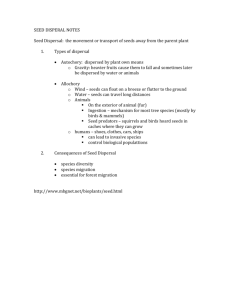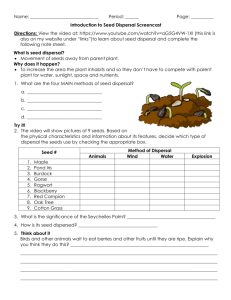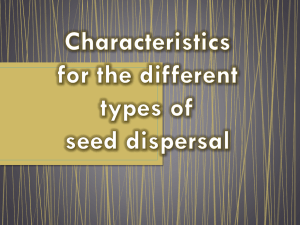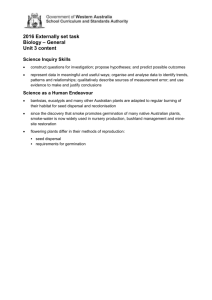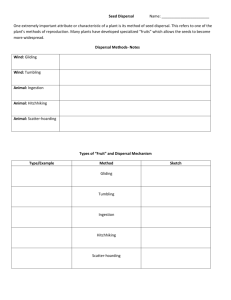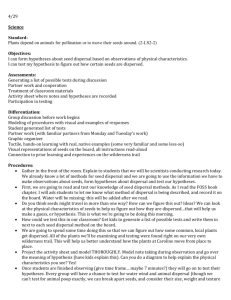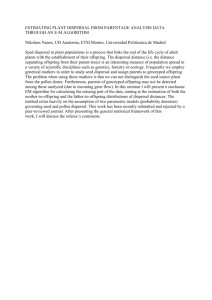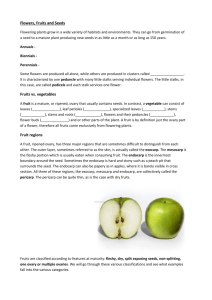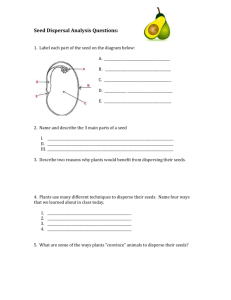Fruit and Seed Dispersal Methods: A Botany Presentation
advertisement
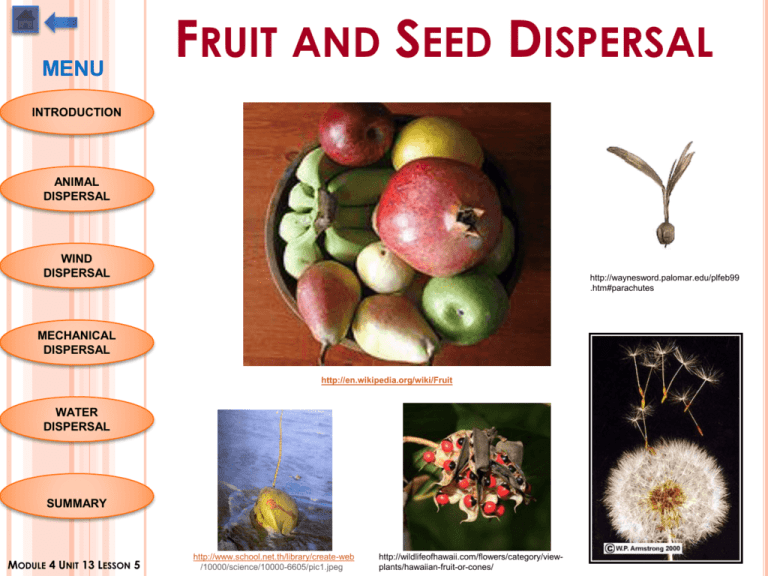
MENU FRUIT AND SEED DISPERSAL INTRODUCTION ANIMAL DISPERSAL WIND DISPERSAL http://waynesword.palomar.edu/plfeb99 .htm#parachutes MECHANICAL DISPERSAL http://en.wikipedia.org/wiki/Fruit WATER DISPERSAL SUMMARY MODULE 4 UNIT 13 LESSON 5 http://www.school.net.th/library/create-web /10000/science/10000-6605/pic1.jpeg http://wildlifeofhawaii.com/flowers/category/viewplants/hawaiian-fruit-or-cones/ X INTRODUCTION Plants need to find new habitats in which to grow their new generation, in order to avoid competition with each other, especially between parents and offspring, for all the necessities of life. In this way, the new generation is able to continue the life cycle of the plant that produced it/them. Dispersal enables this to happen! 2 X OBJECTIVES When you finish, you should be able to: explain the need for/importance of seed dispersal. list the main agents of dispersal. describe the structural modifications of fruits to facilitate various methods of seed dispersal. (Source of pictures >> http://waynesword.palomar.edu/index.htm ) 3 X WHY SHOULD SEEDS BE DISPERSED? A seed contains an embryo in which is all of the genetic information needed for it to develop into an entire plant. If it is to give rise to the next generation of its species, it must somehow get out of the protective casing – the fruit – and find a suitable habitat, e.g. away from its parent plants, in which to grow and develop. Each fruit is structured to ensure dispersal of its seed/s. 4 X THINK AND TELL: A mango and an avocado pear have a similar structure that adapts them to disperse their seed in a similar way. What is this similarity? CHECK www.tntisland.com/fruits.html Both fruits have a fleshy, food-storing pericarp that smells and tastes good and is attractive to animals as food, so they eat the fruit wall and discard the seed, thus helping with its dispersal. 5 X THINK AND TELL: Talk about these different fruits below. Are their seeds dispersed in the same way? Why do you say so? CHECK http://lh4.ggpht.com/_6LWjP0sZ22w?SXig-27Qbvl/AAAAAAAADGE/nPr1YccAPo8/S 6 X FEEDBACK The seeds from the two different fruits would be dispersed in different ways. The fruit on the left has fine hairs, so is likely to be blown from place to place by wind. The other fruits (right) have bright red, food-storing walls, likely to attract birds and other animals who would eat them and either discard the seeds or pass them out unharmed in their faeces. 7 X THINK AND TELL: Look at how buoyant in sea water these seeds of the Asian Coral tree are! They belong to a group that we call ‘drift seeds’. How do you think they are dispersed? CHECK By water. The chart (next slide) shows various seed dispersal methods. Discuss it with your teacher. 8 X EXAMPLES OF DISPERSAL METHODS 9 DIAGRAM OF THE PARTS OF A ‘TYPICAL’, X SIMPLE FLESHY FRUIT The wall of various fruits become modified to enable the fruit to carry out seed dispersal. Pericarp or fruit wall http://academic.kellogg.edu/herbrandsonc/bio111/seeds_fruits_flowers.htm 10 X A. DISPERSED BY ANIMALS 1. Discuss the structural adaptations for dispersal of the seed/s shown by the fruits on the following slides. 2. Examine actual samples similar to those in the slides and discuss the adaptations with your teacher. http://www.picturesof.net/pages/100313-133371-955053.html 11 X STRUCTURAL AIDS TO DISPERSAL BY ANIMALS 1. The outer pericarp (skin) may develop bright colours (apples, Tomatoes, guavas) and distinct odours, both of which serve to attract various animals looking for food. http://www.tradewindsfruit.com/guava.htm 12 X STRUCTURAL AIDS TO DISPERSAL BY ANIMALS 2. The middle fruit-wall layer may become fleshy with stored foods and changes colour when ripe. Paw-paw has a sweet (sugars), succulent, edible pericarp with small seeds in the centre. www.tntisland.com/fruits.html For more information, click open this site: http://jbworld.jbs.stlouis.mo.us/science/resources/flower/fruit1.html 13 X STRUCTURAL AIDS TO DISPERSAL BY ANIMALS Citrus fruits e.g. orange, have juice-filled hairs http://visual.merriam-webster.com/food-kitchen/food/fruits/citrus-fruits_1.php 14 X STRUCTURAL AIDS TO DISPERSAL BY ANIMALS Some fruits store nutrients other than sugars. Their seeds are very small and abundant. The whole fruit with its seeds are often eaten as ‘vegetables’ and seeds defaecated. L – R: Egg plant, Tomato, Pepper http://www.fotosearch.com/GSH126/gs016078/ http://www.fotosearch.com/goodsh oot/fruits-vegetables/GSH126/2/ http://www.freeclipartpictures.com/clipart/ food77.htm 15 X ADAPTATIONS FOR DISPERSAL Brightly coloured wall of Cherries (Left) attract animals who eat the fruits and seeds. Undigested Cherry ‘pits’ (seeds with hard testa) pass out in animal droppings (Right). 16 X STRUCTURAL AIDS TO DISPERSAL BY ANIMALS Birds eat fleshy fruit and distribute the seeds with their waste. The hard testa protects the embryo in the seed while it is inside the animal. Cerasee fruit – bittersweet, seedy pulp is eaten by birds when the ripe fruit splits open. http://mrcsclass.com/mcdougaltext/397_404.pdf 17 X DISPERSED BY ANIMALS Most herbivores cannot crack the hard Calabash shell. But, horses use their mouth to break them open, then they eat the sweet, pulpy mass of seeds and disperse seeds in their dung. http://waynesword.palomar.edu/ww0503.htm 18 X STRUCTURAL AIDS TO DISPERSAL BY ANIMALS Seeds (peanuts (Left), corn grains, sun-flower and pumpkin) may also store nutrients in their cotyledons or endosperm which attract animals as a food source. http://waynesword.palomar.edu/termfr1.htm#baobab http://www.featurepics.com/photos-images/corn+grains.htm 19 STRUCTURAL AIDS TO DISPERSAL BY ANIMALS X Any nuts store fats/oils, starches and proteins and attract not just humans but many insects and rodents who eat them and help disperse them. (L – R Cashew, pecans, almonds, brazil nuts) ( Peas/beans store protein and can be dispersed by humans. http://visual.merriam-webster.com/food-kitchen/food/legumes/peas.php http://www.bulkfoods.com/nuts.asp 20 X STRUCTURAL AIDS TO DISPERSAL BY ANIMALS A sweet-tasting, fleshy layer may develop around the seed (L –R pomegranate, guinep) which is then sucked off and the seeds discarded elsewhere. http://waynesword.palomar.edu/termfr4.htm http://jugalbandi.info/2009/07/mamoncillo-guinep-chenet / 21 X STRUCTURAL AIDS TO DISPERSAL BY ANIMALS The fleshy Cashew ‘apple’ is the swollen succulent stalk/pedicel and base. The ‘nut’ is a dry fruit. Both parts can be eaten. www.fao.org/.../vlibrary/ac306e/ac306e04.htm slog.thestranger.com/2008/04/new_fruit 22 X STRUCTURAL AIDS TO DISPERSAL Ripe, food-storing fruits/vegetables with seeds are eaten by humans, cows, dogs, rats, various insects, also birds, etc. The fruit wall or else the seeds have a hard layer that protects the seeds inside so that they are not damaged as they pass through the animal’s gut. The seeds are passed out in faeces, often at some distance from the plant from which the ripe fruit came. See the next two slides for other means of animal dispersal of seeds. 23 X DISPERSED BY ANIMALS 3. Desmodium fruit breaks into little flattened sections that stick to clothing e.g. socks, or to an animal’s fur. 24 X DISPERSED BY ANIMALS 4.The burrs in this horse’s mane are dry fruit that contain seeds. http://mrcsclass.com/mcdougaltext/397_404.pdf 25 X B. WIND DISPERSAL Each fruit/seed has been modified in some way. Silky hairs on fruits help them to be blown in the wind. Winged seeds spin like helicopter blades. Papery-thin winged seeds (Jacaranda) flutter and spin as wind currents carry them away. http://www.cas.vanderbilt.edu/bioimages/pages/fruitseed-dispersal.htm 26 X STRUCTURAL AIDS TO WIND DISPERSAL In many fruits, the pericarp becomes dry and hard and may grow hairs, hooks, wings (e.g. Jacaranda, Left), prickles or other extensions which aid dispersal or else provide protection for the seeds while the fruit is being dispersed. http://www.classzone.com/books/ml_science_share/vis_ sim/dltm05_pg112_seed/dltm05_pg112_seed.html http://jbworld.jbs.st-louis.mo.us/science/resources/flower/fruit3.html 27 X DID YOU KNOW? ‘Tumbleweeds’ are blown about by the wind and scatter seeds as they move! 28 X C. MECHANICAL DISPERSAL Dry, dehiscent pod is composed of one carpel; splits open when mature along two lines of weakness. Then the two halves curl back, flicking out the seeds that are inside in an explosive manner, scattering them away from he plant. 29 X MECHANICAL DISPERSAL http://visual.merriam-webster.com/plants-gardening/plants/fruits/dry-fruits_2.php 30 X MECHANICAL DISPERSAL Dry fruit that has two carpels separated by a seed-bearing septum; splits open releasing seeds. http://visual.merriam-webster.com/plants-gardening/plants/fruits/dry-fruits_2.php 31 X MECHANICAL DISPERSAL Capsule -The carpels were originally fused together to form the gynoecium. The carpels separate to expose the seeds which can be flung out of the capsule. An example is ackee. Flesh is eaten, seed discarded, and so is dispersed. www.jamaica-beach-villa.com/ackee.htm 32 X MECHANICAL DISPERSAL Sandbox flower (top, red) and exploding fruit. dry fruit wall seed 33 X D. WATER DISPERSAL Coconut trees and mangroves have their natural habitat near water. Their fruits/seeds are water dispersed. To do so, the fruits and seeds must be adapted to be light and buoyant and must be able to drift in water currents. 34 X WATER DISPERSAL Air is trapped between the fibrous coir and causes the fruit to be bouyant, so it can float in water for long distances. The hard endocarp/shell protects the seed with its embryo inside. http://www2.estrellamount ain.edu/faculty/farabee/bi obk/BioBookflowersII.html #Double Fertilization 35 X WATER DISPERSAL Viviparous seedling of the red mangrove – has germinated while still in the fruit that is attached to the parent. Note the elongated hypocotyl or embryonic root. When the seedling drops into water, it floats with the root still pointed downward. If it hits soft mud, the tap root grows in the soft mud and quickly establishes the plant. 36 X DID YOU KNOW? This map shows the distances over which water-dispersed ‘drift seeds’ can travel! http://waynesword.palomar.edu/pldec398.htm 37 X WATER DISPERSAL Drift fruits and seeds of Beach bean 38 X DID YOU KNOW? Many plants are killed off when a fire becomes extremely fierce and hot ( high intensity), but some plants in the Australian bush are very reliant on fire for their seed to be dispersed. An example is a plant called ‘Old Man Baksia’. This plant is killed by fire but uses the fire to trigger the seed dispersal mechanism. http://www.zephyrus.co.uk/firedispersal.html 39 X SUMMARY 1. Wind Dispersal -- Small, light seeds with wings/hairs for mobility. 2. Animal Dispersal Fruit stores food so is eaten; seeds pass through digestive tract unharmed or are seed/s discarded. Fruits and seeds have hooks that in catch in fur/hair, or clothing. 3. Water Dispersal http://www.zephyrus.co.uk/seeddispersal1.html Some fruits have trapped air so can float. 4. Mechanical Ejection of Seeds as fruit dries and explodes open. 40 X SUMMARY 1. 2. All structural modifications of the fruit wall and of physiological processes are developed to ensure that the seed/s are dispersed away from the parent plant, to ensure survival of that plant species. Do the quiz at this website: http://www.classzone.com/books/ml_science_share/ vis_sim/dltm05_pg112_seed/dltm05_pg112_seed.html 41
